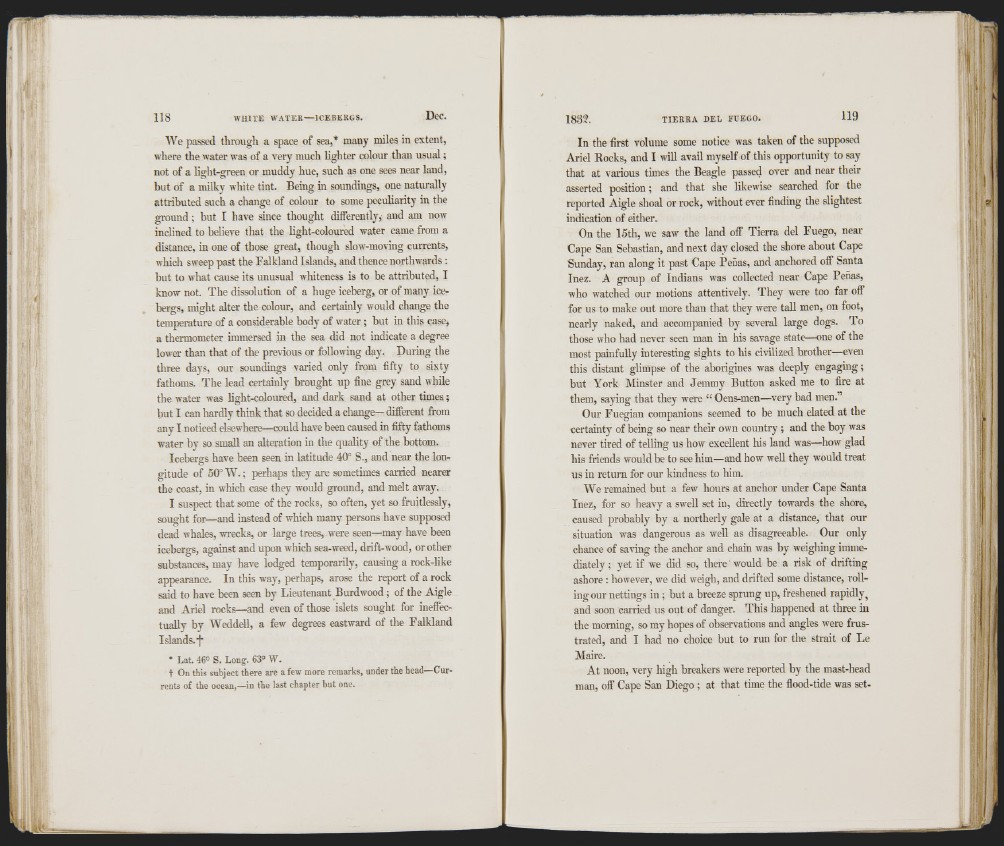
118 WHITE WATER— ICEBERGS. Dec.
We passed through a space of sea,* many miles in extent,
where the water was of a very much lighter colour than usual;
not of a Hght-green or muddy hue, such as one sees near land,
but of a milky white tint. Being in soimdings, one naturally
attributed such a change of colour to some peculiarity in the
ground ; but I have since thought differently, and am now
inclined to believe that the light-coloured water came from a
distance, in one of those great, though slow-moving currents,
wliich sweep past the Falkland Islands, and thence northwards :
but to what cause its unusual wliiteness is to be attributed, I
know not. The dissolution of a huge iceberg, or of many icebergs,
might alter tbe colour, and certainly would change the
temperature of a considerable body of water ; hut in this case,
a thermometer immersed in the sea did not indicate a degree
lower than that of the previous or following day. During the
three days, our soundings varied only from fifty to sixty
fathoms. The lead certainly brought up fine grey sand while
the water was light-coloured, and dark sand at other times;
but I can hardly think that so decided a change—different from
any I noticed elsewhere—could have been caused in fifty fathoms
water by so small an alteration in the quality of the bottom.
Icebergs have been seen in latitude 40° S., and near the longitude
of 50° AV.; perhaps they are sometimes carried nearer
the coast, in which case they would ground, and melt away.
I suspect that some of the rocks, so often, yet so fruitlessly,
sought for—and instead of which many persons have supposed
dead whales, wrecks, or large trees, were seen—may have been
icebergs, against and upon which sea-weed, drift-wood, or other
substances, may have lodged temporarily, causing a rock-like
appearance. In this way, perhaps, arose the report of a rock
said to have been seen by Lieutenant Burdwood ; of the Aigle
and Ariel rocks—and even of those islets sought for ineffectually
by AVeddell, a few degrees eastward of the Falkland
Islands.!
• Lat. 46° S. Long. 63° AV.
t On this subject there are a few more remarks, under the head—Currents
of the ocean,—in the last chapter but one.
liir
1832. T IER RA DEL FUEGO. 119
In the first volume some notice was taken of the supposed
Ariel Rocks, and I wiU avail myself of this opportunity to say
that at various times the Beagle passed over and near their
asserted position; and that she likewise searched for the
reported Aigle shoal or rock, without ever finding the slightest
indication of either.
On the 15th, we saw the land off Tierra del Fuego, near
Cape San Sebastian, and next day closed the shore about Cape
Sunday, ran along it past Cape Peñas, and anchored off Santa
Inez. A group of Indians was collected near Cape Peñas,
who watched our motions attentively. They were too far off
for us to make out more than that they were tail men, on foot,
nearly naked, and accompanied by several large dogs. To
those who had never seen man in his savage state—one of the
most painfully interesting sights to his civilized brother—even
this distant glimpse of the aborigines was deeply engaging;
but York Minster and Jemmy Button asked me to fire at
them, saying that they were “ Oens-men—very bad men.”
Our Fuegian companions seemed to be much elated at the
certainty of being so near their own country ; and the boy was
never tired of telling us how excellent his land was—^how glad
his friends would be to see him—and how well they would treat
us in return for our kindness to him.
AVe remained but a few hours at anchor under Cape Santa
Inez, for so heavy a swell set in, directly towai'ds the shore,
caused probably by a northerly gale at a distance, that our
situation was dangerous as well as disagreeable. Our only
chance of saving the anchor and chain was by weigWng immediately
; yet if we did so, there' would he a risk of drifting
ashore : however, we did weigh, and drifted some distance, rolling
our nettings in ; but a breeze sprung up, freshened rapidly,
and soon carried us out of danger. This happened at three in
the morning, so my hopes of observations and angles were frustrated,
and I had no choice but to run for the strait of Le
Maire.
At noon, very high breakers were reported by the mast-head
man, off Cape San Diego ; at that time the flood-tide was set-
Ml
I
I i
! !■!*
i II
!' ^
Í
Í I
" » I
i l